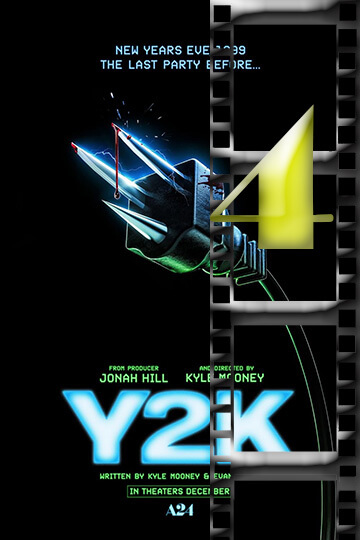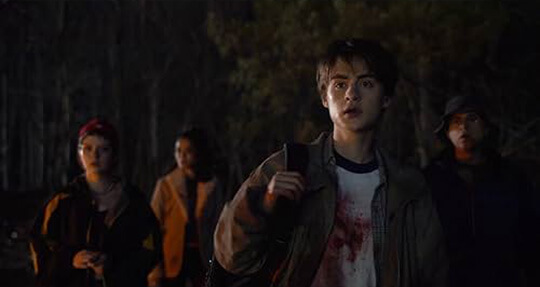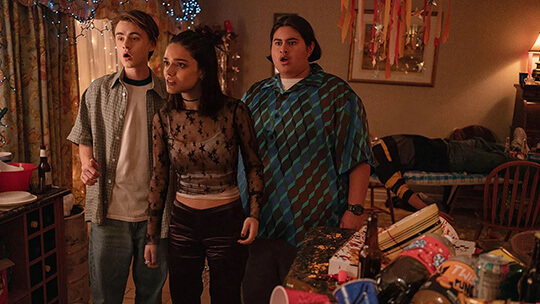



What’s It About
Two high school nobodies make the decision to crash the last major celebration before the new millennium on New Year’s Eve 1999. The night becomes even crazier than they could have ever dreamed when the clock strikes midnight.



MOVIESinMO REVIEW
Y2K” is Kyle Mooney’s directorial debut and a weird time capsule that pays homage to and attempts to deconstruct the culture of the late 1990s. The film is born from the popular stand-up style of Mooney—his self-referential jokes and strong focus on millennial nostalgia. Mooney developed a special way of being funny from his work on “Saturday Night Live.” He seems to want to turn his funny sketches into a full-length story that mixes teen comedy, horror, and cultural ideas. The narrative centers on two high school outcasts, Eli (Jaeden Martell) and Danny (Julian Dennison), who embody the archetypal awkward teenagers on the cusp of a potentially transformative New Year’s Eve. Set on December 31, 1999, the film taps immediately into some collective cultural memory: the anticipation felt around the world, the uncertainty of technology, and millennial anxiety. They are emblematic of a generation that stands at the brink of a new technological era, their social inexperience reflecting greater societal uncertainty about what is ahead with the coming digital revolution. The first half of this movie is pretty standard fare for a teen comedy, with relationships and social issues handled warmly and with due regard for humor. Martell and Dennison have very real chemistry between them; the friendship they play feels believable, grounding the more outrageous parts of the plot. They bring a depth the script never really explores. What makes it more interesting is when Rachel Zegler comes through with her character to show the real social dreams in the beginning. Just when one thought that this teen comedy film would go around in light stories, its sudden switch to horror-comedy mode takes the biggest and probably the most disturbing twist of it all in this story. It was a point where gadget killers become the robots; thus, it reflected fears towards technology in late 1990s time. This could have been a clever look at people’s fears about technology during that time, the early digital changes, and the worry about technology failing shown by the Y2K bug. However, the way Mooney does it reveals a large problem in creating a clear funny idea; instead, the film turns into a mix of different ’90s culture references. The movie transforms into a nostalgia-driven scavenger hunt, throwing in callbacks that range from Tamagotchis and Billy Blanks workout videos to AIM away messages and rap-rock aesthetics. The reference to Y2K fails to deal with any of the rich cultural commentary that anxious viewers might have hoped to glean from it. Truly, the audience has seen far less annoying representations of it. The real-world fear over the millennium bug, a bona fide tech concern that caught the world’s attention, is turned almost into mere background noise. Accepting this as a basis for cheap laughs and shallow cultural signifiers, Mooney misses the chance to exploit the complicated psychological terrain of a society unsure about technological infrastructure. The opportunity to explore fears about technology hope for the future, and generational identity is completely ignored. Fred Durst’s cameo sums up the tension between the film and nostalgia. What could have been an interesting meta-commentary on celebrity and cultural memory becomes just another throwaway reference. Durst, himself a symbol of late ’90s pop culture, appears more as a novelty than a meaningful addition to the genre. This approach reflects the broader problem with “Y2K”. It confuses acknowledgement for meaningful engagement. The film’s second half suffers from over-narration. After the initial high-concept premise of technology-gone-wild, the story goes off topic with a journey through suburban landscapes. The characters lose their initial dynamism, reduced to delivering increasingly desperate pop culture references and engaging in increasingly nonsensical plot developments. What begins as a possible incisive deconstruction of the teen comedy and technological horror is rendered into a bland, directionless exercise in indulgence for the sake of nostalgia. The film technically betrays Mooney’s visual gifts and understanding of ’90s aesthetic language. The production design well-captures the period’s visual texture, with authentic simulations of color palettes, fashion decisions, and technology-related artifacts. The shooting plan works with accuracy to this theme. The compelling precision of the vision only serves to expose how empty and meaningless the story is. In it becomes a pretty shell with absolutely no concern for what goes on inside. The youthful cast is apparently the film’s biggest asset. Jaeden Martell, Julian Dennison, and Rachel Zegler display impressive screen presence and brilliantly comic timing. They glide through the script’s inconsistencies with genuine charm because somewhere within this fundamentally flawed narrative framework lie even richer performances. Their performances hint at the more nuanced film that could have existed—a genuine exploration of teenage experience at the turn of the millennium. “Y2K” ultimately represents a significant missed opportunity. In attempting to create a nostalgic horror-comedy, Mooney produces a film that feels more like an extended sketch comedy bit than a fully realized narrative. The movie becomes a testament to the dangers of nostalgia as a storytelling strategy. Recognition is not the same as meaningful engagement. For audiences seeking a better exploration of millennial-era fears or a genuinely clever comedy, “Y2K” will prove to be hurtfully disappointing. It has the look of the late ’90s but completely fails to capture the era’s emotional and technological complexity. The film stands as a perfect example of how cultural nostalgia, when deployed without genuine insight, can transform potentially interesting premises into shallow, forgettable entertainment. An ambitious but fundamentally misguided attempt at millennial humor and horror, “Y2K” proves that recognizable references alone cannot substitute for genuine storytelling, character development, or cultural insight.
OUR RATING – A SUBURBAN 4

